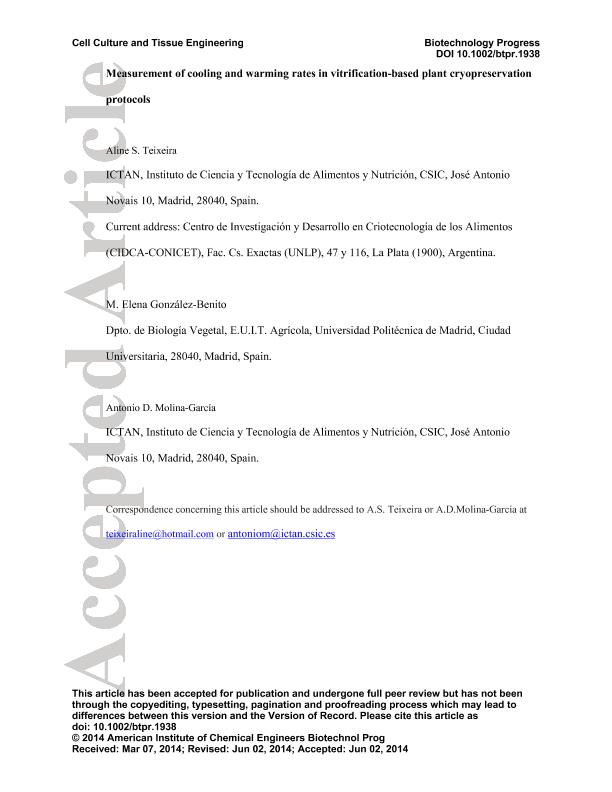Mostrar el registro sencillo del ítem
dc.contributor.author
Schneider Teixeira, Aline

dc.contributor.author
Gonzalez Benito, M. Elena
dc.contributor.author
Molina García, Antonio D.
dc.date.available
2016-12-29T21:23:06Z
dc.date.issued
2014-08
dc.identifier.citation
Schneider Teixeira, Aline; Gonzalez Benito, M. Elena; Molina García, Antonio D.; Measurement of cooling and warming rates in vitrification-based plant cryopreservation protocols; American Chemical Society; Biotechnology Progress; 30; 5; 8-2014; 1177–1184
dc.identifier.issn
8756-7938
dc.identifier.uri
http://hdl.handle.net/11336/10655
dc.description.abstract
Cryopreservation protocols include the use of additives and pre-treatments aimed to reduce the probability of ice nucleation at all temperatures, mainly through micro-viscosity increase. Still, there is a risk of ice formation in the temperature region comprised between the equilibrium freezing (Tf) and the glass transition (TG) temperatures. Consequently, fast cooling and warming, especially in this region, is a must to avoid ice-derived damage. Vitrification and droplet-vitrification techniques, frequently used cryopreservation protocols based in fast cooling, were studied, alongside with the corresponding warming procedures. A very fast data acquisition system, able to read very low temperatures, down to that of liquid nitrogen, was employed. Cooling rates, measured between -20 and -120 ºC, ranged from ca. 5 ºC s-1 to 400 ºC s-1, while warming rates spanned from ca. 2 ºC s-1 to 280 ºC s-1, for the different protocols and conditions studied. A wider measuring window (0 ºC to -150 ºC) produced lower rates for all cases. The cooling and warming rates were also related to the survival observed after the different procedures. Those protocols with the faster rates yielded the highest survival percentages.
dc.format
application/pdf
dc.language.iso
eng
dc.publisher
American Chemical Society

dc.rights
info:eu-repo/semantics/openAccess
dc.rights.uri
https://creativecommons.org/licenses/by-nc-sa/2.5/ar/
dc.subject
Cooling
dc.subject
Warming
dc.subject
Rates
dc.subject
Vitrification
dc.subject
Droplet-Vitrification
dc.subject
Plant
dc.subject.classification
Biofísica

dc.subject.classification
Ciencias Biológicas

dc.subject.classification
CIENCIAS NATURALES Y EXACTAS

dc.title
Measurement of cooling and warming rates in vitrification-based plant cryopreservation protocols
dc.type
info:eu-repo/semantics/article
dc.type
info:ar-repo/semantics/artículo
dc.type
info:eu-repo/semantics/publishedVersion
dc.date.updated
2016-12-12T14:11:59Z
dc.identifier.eissn
1520-6033
dc.journal.volume
30
dc.journal.number
5
dc.journal.pagination
1177–1184
dc.journal.pais
Estados Unidos

dc.journal.ciudad
Washington
dc.description.fil
Fil: Schneider Teixeira, Aline. Consejo Nacional de Investigaciones Científicas y Técnicas. Centro Científico Tecnológico la Plata. Centro de Investigaciones En Criotecnología de Alimentos (i); Argentina. Universidad Nacional de La Plata. Facultad de Ciencias Exactas; Argentina. Instituto de Ciencia y Tecnología de Alimentos y Nutrición; España
dc.description.fil
Fil: Gonzalez Benito, M. Elena. Universidad Politecnica de Madrid; España
dc.description.fil
Fil: Molina García, Antonio D.. Consejo Superior de Investigaciones Científicas. Instituto de Ciencia y Tecnologia de Alimentos y Nutrición; España
dc.journal.title
Biotechnology Progress

dc.relation.alternativeid
info:eu-repo/semantics/altIdentifier/doi/http://dx.doi.org/10.1002/btpr.1938
dc.relation.alternativeid
info:eu-repo/semantics/altIdentifier/url/http://onlinelibrary.wiley.com/doi/10.1002/btpr.1938/abstract
Archivos asociados
